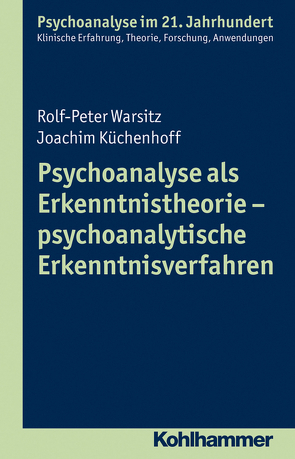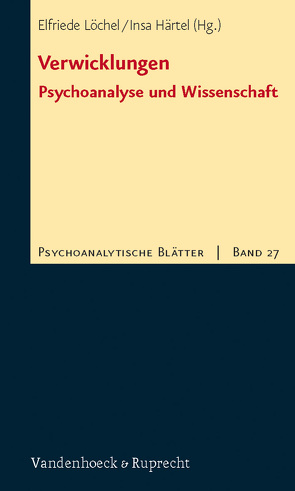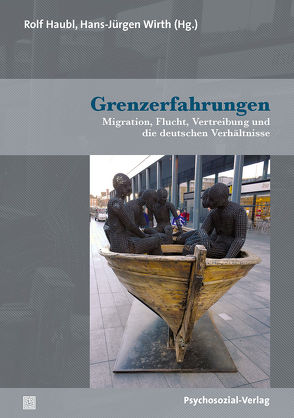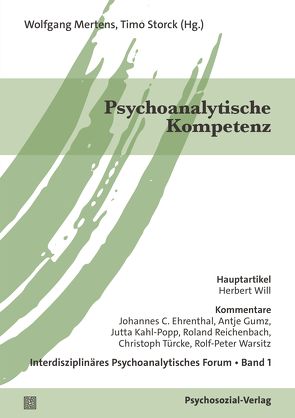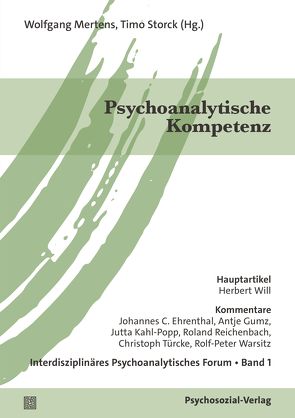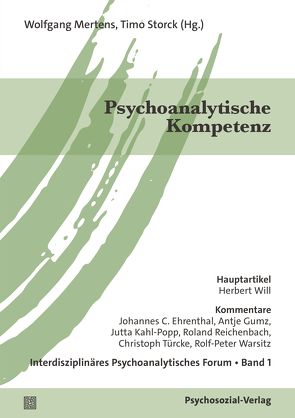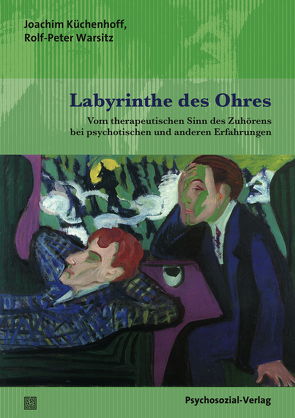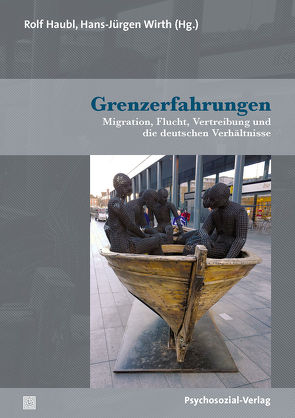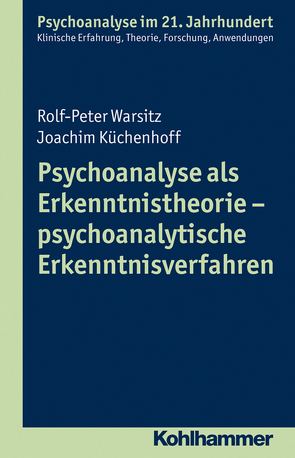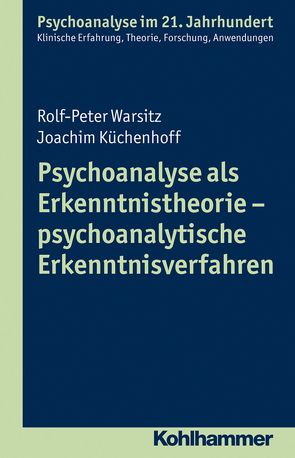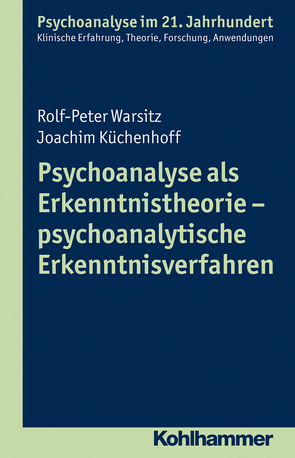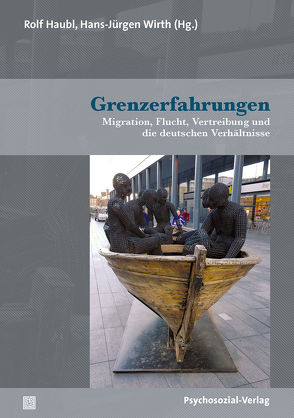Epistemological theories represent the foundation of clinical practice, enabling therapists to understand their own work better. At the same time, they are also fundamental to the self-image of a science or academic discipline in finding and keeping its place within the scientific and scholarly community. These points are particularly important for psychoanalysis, as the field has many collaborating partners, ranging from neurobiology to literary studies & and also because its scientific status is still disputed. This volume positions psychoanalysis epistemologically, but at the same time shows that it follows its own unmistakable epistemological pathway.
Aktualisiert: 2023-06-07
> findR *
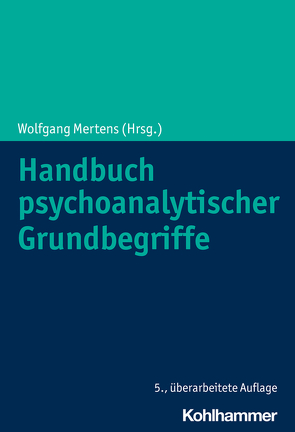
This handbook written by 140 scientists provides clear explanations, based on a standardized scheme, of the fundamental concepts of psychoanalysis. In addition to the definition of the terms, the classic understanding of them and their background in the history of ideas, and the further development of classical psychoanalysis into the individual schools are described in detail. At the same time, the handbook picks up from interdisciplinary debates by entering into a dialogue with neighbouring fields such as biology, psychology, sociology and cultural studies. Psychoanalysis, which many have repeatedly described as being obsolete and outdated, proves in this dictionary to be extremely creative and expansive. Those who are interested in the fundamental development of awareness, which is only conceivable through the inclusion of unconscious processes, will receive countless fresh ideas from this work. This fourth edition of the handbook has added the following concepts: general theory of seduction, desire, the occult, de-objectification, deciding, decision, implicit relationship knowledge, intersubjectivity, conversation, performance, psychodynamics, subject, separation anxiety & separation, unconscious & the Unconscious II, father metaphor, and transformational object.
Aktualisiert: 2023-06-07
Autor:
Thomas Auchter,
Werner Balzer,
Rosmarie Barwinski,
Markus Bassler,
Nikolaus Becker,
Karin Bell,
Wolfgang Berner,
Ulrich Berns,
Siegfried Bettighofer,
Manfred E. Beutel,
Werner Bohleber,
Lorenz Böllinger,
Brigitte Boothe,
Georg Bruns,
Michael B. Buchholz,
Dieter Bürgin,
Ralph J. Butzer,
Thomas Charlier,
Peter Conzen,
Gerhard Dammann,
Joachim Danckwardt,
Josef Dantlgraber,
Eckard Daser,
Heinrich Deserno,
Heinrich Dornes,
Birger Dulz,
Annegret Eckhardt-Henn,
Wolfram Ehlers,
Martin Ehlert Balzer,
Michael Ermann,
Gottfried Fischer,
Harald J Freyberger,
Willi Frings,
Oskar Frischenschlager,
Gudrun Fuchs,
Peter Geissler,
Hanna Gekle,
Alf Gerlach,
Patrizia Giampieri-Deutsch,
Ludger van Gisteren,
Günter Gödde,
Ralph Grabhorn,
Tilman Grande,
Jürgen Grieser,
Ludwig Haesler,
Andreas Hamburger,
Norbert Hartkamp,
Hans Peter Hartmann,
Stephan Hau,
Rolf Haubl,
Robert Heim,
Reinhard Hellmann,
Peter Henningsen,
Heinz Henseler,
Reinhard Herold,
Gereon Heuft,
Helmut Hinz,
Mathias Hirsch,
Albrecht Hirschmüller,
Udo Hock,
Rainer Holm-Hadulla,
Michael Hölzer,
Hans-Peter Kapfhammer,
Otto F. Kernberg,
Ingrid Kerz-Rühling,
Matthias Kettner,
Vera King,
Günther Klug,
Rolf Klüwer,
Thomas Köhler,
Hartmuth König,
Jürgen Körner,
Hartmut Kraft,
Rainer Krause,
Reinhard Kreische,
Martin Kurthen,
Ross Lazar,
Falk Leichsenring,
Günter Lempa,
Wolfgang Leuschner,
Marianne Leuzinger-Bohleber,
Elfriede Löchel,
Mathias Lohmer,
Christiane Ludwig-Körner,
Christian Maier,
Stavros Mentzos,
Wolfgang Mertens,
Wolfgang Milch,
Angela Moré,
Thomas Mueller,
Heinz Müller-Pozzi,
Waltraud Nagell,
Dietmut Niedecken,
Bernd Nitzschke,
Gerrd Overbeck,
Diana Pflichthofer,
Reinhard Plassmann,
Doris Pouget-Schors,
Hans Quint,
Hartmut Raguse,
Udo Rauchfleisch,
Günter Reich,
Stefan Reichard,
Reimut Reiche,
Christian Heinrich Röder,
Ulrich Rüger,
Sabine Anna Saalfeld,
Cordelia Schmidt-Hellerau,
Matthias Schmutz,
Karin Schneider-Henn,
Hellen Schoenhals Hart,
Lothar Schon,
Alfred Schöpf,
Ulrich Schultz-Venrath,
Gerhard Schüßler,
Günter H. Seidler,
Lucia Steinmetzer,
Achim Stephan,
Timo Storck,
Bernhard Strauß,
Ulrich Streeck,
Dieter Tenbrink,
Cornelia Thürheimer,
Winfrid Trimborn,
Rolf Vogt,
Heribert Wahl,
Ruth Waldeck,
Bruno Waldvogel,
Rolf-Peter Warsitz,
Peter Wegner,
Heinz Weiß,
Franz Wellendorf,
Corinna Wernz,
Jörg Wiesse,
Herbert Will,
Lutz Wittmann,
Michael Wolf,
Wolfgang Wöller,
Siegfried Zepf
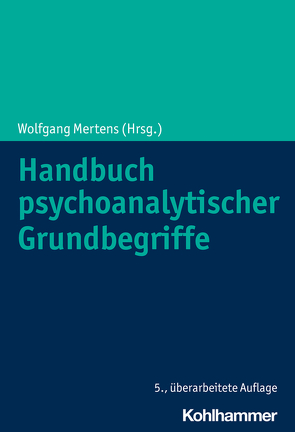
This handbook written by 140 scientists provides clear explanations, based on a standardized scheme, of the fundamental concepts of psychoanalysis. In addition to the definition of the terms, the classic understanding of them and their background in the history of ideas, and the further development of classical psychoanalysis into the individual schools are described in detail. At the same time, the handbook picks up from interdisciplinary debates by entering into a dialogue with neighbouring fields such as biology, psychology, sociology and cultural studies. Psychoanalysis, which many have repeatedly described as being obsolete and outdated, proves in this dictionary to be extremely creative and expansive. Those who are interested in the fundamental development of awareness, which is only conceivable through the inclusion of unconscious processes, will receive countless fresh ideas from this work. This fourth edition of the handbook has added the following concepts: general theory of seduction, desire, the occult, de-objectification, deciding, decision, implicit relationship knowledge, intersubjectivity, conversation, performance, psychodynamics, subject, separation anxiety & separation, unconscious & the Unconscious II, father metaphor, and transformational object.
Aktualisiert: 2023-06-01
Autor:
Thomas Auchter,
Werner Balzer,
Rosmarie Barwinski,
Markus Bassler,
Nikolaus Becker,
Karin Bell,
Wolfgang Berner,
Ulrich Berns,
Siegfried Bettighofer,
Manfred E. Beutel,
Werner Bohleber,
Lorenz Böllinger,
Brigitte Boothe,
Georg Bruns,
Michael B. Buchholz,
Dieter Bürgin,
Ralph J. Butzer,
Thomas Charlier,
Peter Conzen,
Gerhard Dammann,
Joachim Danckwardt,
Josef Dantlgraber,
Eckard Daser,
Heinrich Deserno,
Heinrich Dornes,
Birger Dulz,
Annegret Eckhardt-Henn,
Wolfram Ehlers,
Martin Ehlert Balzer,
Michael Ermann,
Gottfried Fischer,
Harald J Freyberger,
Willi Frings,
Oskar Frischenschlager,
Gudrun Fuchs,
Peter Geissler,
Hanna Gekle,
Alf Gerlach,
Patrizia Giampieri-Deutsch,
Ludger van Gisteren,
Günter Gödde,
Ralph Grabhorn,
Tilman Grande,
Jürgen Grieser,
Ludwig Haesler,
Andreas Hamburger,
Norbert Hartkamp,
Hans Peter Hartmann,
Stephan Hau,
Rolf Haubl,
Robert Heim,
Reinhard Hellmann,
Peter Henningsen,
Heinz Henseler,
Reinhard Herold,
Gereon Heuft,
Helmut Hinz,
Mathias Hirsch,
Albrecht Hirschmüller,
Udo Hock,
Rainer Holm-Hadulla,
Michael Hölzer,
Hans-Peter Kapfhammer,
Otto F. Kernberg,
Ingrid Kerz-Rühling,
Matthias Kettner,
Vera King,
Günther Klug,
Rolf Klüwer,
Thomas Köhler,
Hartmuth König,
Jürgen Körner,
Hartmut Kraft,
Rainer Krause,
Reinhard Kreische,
Martin Kurthen,
Ross Lazar,
Falk Leichsenring,
Günter Lempa,
Wolfgang Leuschner,
Marianne Leuzinger-Bohleber,
Elfriede Löchel,
Mathias Lohmer,
Christiane Ludwig-Körner,
Christian Maier,
Stavros Mentzos,
Wolfgang Mertens,
Wolfgang Milch,
Angela Moré,
Thomas Mueller,
Heinz Müller-Pozzi,
Waltraud Nagell,
Dietmut Niedecken,
Bernd Nitzschke,
Gerrd Overbeck,
Diana Pflichthofer,
Reinhard Plassmann,
Doris Pouget-Schors,
Hans Quint,
Hartmut Raguse,
Udo Rauchfleisch,
Günter Reich,
Stefan Reichard,
Reimut Reiche,
Christian Heinrich Röder,
Ulrich Rüger,
Sabine Anna Saalfeld,
Cordelia Schmidt-Hellerau,
Matthias Schmutz,
Karin Schneider-Henn,
Hellen Schoenhals Hart,
Lothar Schon,
Alfred Schöpf,
Ulrich Schultz-Venrath,
Gerhard Schüßler,
Günter H. Seidler,
Lucia Steinmetzer,
Achim Stephan,
Timo Storck,
Bernhard Strauß,
Ulrich Streeck,
Dieter Tenbrink,
Cornelia Thürheimer,
Winfrid Trimborn,
Rolf Vogt,
Heribert Wahl,
Ruth Waldeck,
Bruno Waldvogel,
Rolf-Peter Warsitz,
Peter Wegner,
Heinz Weiß,
Franz Wellendorf,
Corinna Wernz,
Jörg Wiesse,
Herbert Will,
Lutz Wittmann,
Michael Wolf,
Wolfgang Wöller,
Siegfried Zepf
Psychoanalytische Denkweisen geben wissenschaftlichen Forschungsmethoden neue Impulse.
Aktualisiert: 2023-05-28
> findR *
Spätestens seit der spektakulären Entscheidung der Bundesregierung unter Merkel vom 4. September 2015, die Grenzen für Tausende Flüchtlinge zu öffnen, steht Deutschland im Zeichen der Flüchtlingskrise. Die BeiträgerInnen dieses Sammelbandes nähern sich der Problematik zum einen hinsichtlich der praktischen Arbeit mit Geflüchteten, zum anderen hinsichtlich ihrer kulturellen, gesellschaftlichen und politischen Dimensionen.
Aktualisiert: 2023-05-19
Autor:
Heinz Bude,
Zeljko Cunovic,
Dorothee Dienstbühl,
Manfred Gerspach,
Marga Günther,
Rolf Haubl,
Hartmut Häußermann,
Anke Kerschgens,
Marian Kratz,
Joachim Küchenhoff,
Anna Leszczynska-Koenen,
Albert Scherr,
Rolf-Peter Warsitz,
Meike Weber,
Hans-Jürgen Wirth,
David Zimmermann
»Kompetenzorientierung« ist zum zentralen Schlagwort innerhalb einer fächer- und bereichsübergreifenden Diskussion geworden. In seinem Hauptartikel diskutiert Herbert Will die Versuche, im Kontext einer psychoanalytischen Haltung diverse Kompetenzen zu identifizieren. Wichtige Vertreter*innen der klinischen Psychoanalyse, der empirischen Psychotherapieforschung und der kritischen Bildungsforschung reagieren auf seine Position, wodurch dialogisch neue und vertiefende Perspektiven entstehen.
Aktualisiert: 2023-05-18
> findR *
»Kompetenzorientierung« ist zum zentralen Schlagwort innerhalb einer fächer- und bereichsübergreifenden Diskussion geworden. In seinem Hauptartikel diskutiert Herbert Will die Versuche, im Kontext einer psychoanalytischen Haltung diverse Kompetenzen zu identifizieren. Wichtige Vertreter*innen der klinischen Psychoanalyse, der empirischen Psychotherapieforschung und der kritischen Bildungsforschung reagieren auf seine Position, wodurch dialogisch neue und vertiefende Perspektiven entstehen.
Aktualisiert: 2023-05-10
> findR *
»Kompetenzorientierung« ist zum zentralen Schlagwort innerhalb einer fächer- und bereichsübergreifenden Diskussion geworden. In seinem Hauptartikel diskutiert Herbert Will die Versuche, im Kontext einer psychoanalytischen Haltung diverse Kompetenzen zu identifizieren. Wichtige Vertreter*innen der klinischen Psychoanalyse, der empirischen Psychotherapieforschung und der kritischen Bildungsforschung reagieren auf seine Position, wodurch dialogisch neue und vertiefende Perspektiven entstehen.
Aktualisiert: 2023-05-08
> findR *
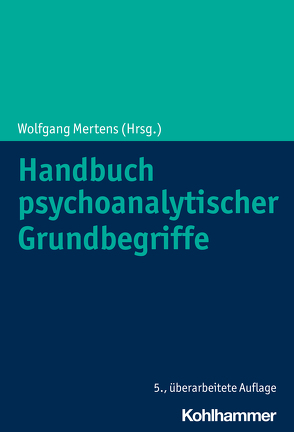
This handbook written by 140 scientists provides clear explanations, based on a standardized scheme, of the fundamental concepts of psychoanalysis. In addition to the definition of the terms, the classic understanding of them and their background in the history of ideas, and the further development of classical psychoanalysis into the individual schools are described in detail. At the same time, the handbook picks up from interdisciplinary debates by entering into a dialogue with neighbouring fields such as biology, psychology, sociology and cultural studies. Psychoanalysis, which many have repeatedly described as being obsolete and outdated, proves in this dictionary to be extremely creative and expansive. Those who are interested in the fundamental development of awareness, which is only conceivable through the inclusion of unconscious processes, will receive countless fresh ideas from this work. This fourth edition of the handbook has added the following concepts: general theory of seduction, desire, the occult, de-objectification, deciding, decision, implicit relationship knowledge, intersubjectivity, conversation, performance, psychodynamics, subject, separation anxiety & separation, unconscious & the Unconscious II, father metaphor, and transformational object.
Aktualisiert: 2023-05-03
Autor:
Thomas Auchter,
Martin Ehlert Balzer,
Werner Balzer,
Rosmarie Barwinski,
Markus Bassler,
Nikolaus Becker,
Karin Bell,
Wolfgang Berner,
Ulrich Berns,
Siegfried Bettighofer,
Manfred E. Beutel,
Werner Bohleber,
Lorenz Böllinger,
Brigitte Boothe,
Georg Bruns,
Michael B. Buchholz,
Dieter Bürgin,
Ralph J. Butzer,
Thomas Charlier,
Peter Conzen,
Gerhard Dammann,
Joachim Danckwardt,
Josef Dantlgraber,
Eckard Daser,
Heinrich Deserno,
Heinrich Dornes,
Birger Dulz,
Annegret Eckhardt-Henn,
Wolfram Ehlers,
Michael Ermann,
Gottfried Fischer,
Harald J Freyberger,
Willi Frings,
Oskar Frischenschlager,
Gudrun Fuchs,
Peter Geissler,
Hanna Gekle,
Alf Gerlach,
Patrizia Giampieri-Deutsch,
Ludger van Gisteren,
Günter Gödde,
Ralph Grabhorn,
Tilman Grande,
Jürgen Grieser,
Ludwig Haesler,
Andreas Hamburger,
Hellen Schoenhals Hart,
Norbert Hartkamp,
Hans Peter Hartmann,
Stephan Hau,
Rolf Haubl,
Robert Heim,
Reinhard Hellmann,
Peter Henningsen,
Heinz Henseler,
Reinhard Herold,
Gereon Heuft,
Helmut Hinz,
Mathias Hirsch,
Albrecht Hirschmüller,
Udo Hock,
Rainer Holm-Hadulla,
Michael Hölzer,
Hans-Peter Kapfhammer,
Otto F. Kernberg,
Ingrid Kerz-Rühling,
Matthias Kettner,
Vera King,
Günther Klug,
Rolf Klüwer,
Thomas Köhler,
Hartmuth König,
Jürgen Körner,
Hartmut Kraft,
Rainer Krause,
Reinhard Kreische,
Martin Kurthen,
Ross Lazar,
Falk Leichsenring,
Günter Lempa,
Wolfgang Leuschner,
Marianne Leuzinger-Bohleber,
Elfriede Löchel,
Mathias Lohmer,
Christiane Ludwig-Körner,
Christian Maier,
Stavros Mentzos,
Wolfgang Mertens,
Wolfgang Milch,
Angela Moré,
Thomas Mueller,
Waltraud Nagell,
Dietmut Niedecken,
Bernd Nitzschke,
Gerrd Overbeck,
Diana Pflichthofer,
Reinhard Plassmann,
Doris Pouget-Schors,
Heinz Müller Pozzi,
Hans Quint,
Hartmut Raguse,
Udo Rauchfleisch,
Günter Reich,
Stefan Reichard,
Reimut Reiche,
Christian Heinrich Röder,
Ulrich Rüger,
Sabine Anna Saalfeld,
Cordelia Schmidt-Hellerau,
Matthias Schmutz,
Karin Schneider-Henn,
Lothar Schon,
Alfred Schöpf,
Ulrich Schultz-Venrath,
Gerhard Schüßler,
Günter H. Seidler,
Lucia Steinmetzer,
Achim Stephan,
Timo Storck,
Bernhard Strauß,
Ulrich Streeck,
Dieter Tenbrink,
Cornelia Thürheimer,
Winfrid Trimborn,
Rolf Vogt,
Heribert Wahl,
Ruth Waldeck,
Bruno Waldvogel,
Rolf-Peter Warsitz,
Peter Wegner,
Heinz Weiß,
Franz Wellendorf,
Corinna Wernz,
Jörg Wiesse,
Herbert Will,
Lutz Wittmann,
Michael Wolf,
Wolfgang Wöller,
Siegfried Zepf
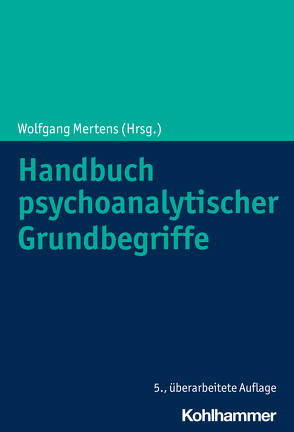
This handbook written by 140 scientists provides clear explanations, based on a standardized scheme, of the fundamental concepts of psychoanalysis. In addition to the definition of the terms, the classic understanding of them and their background in the history of ideas, and the further development of classical psychoanalysis into the individual schools are described in detail. At the same time, the handbook picks up from interdisciplinary debates by entering into a dialogue with neighbouring fields such as biology, psychology, sociology and cultural studies. Psychoanalysis, which many have repeatedly described as being obsolete and outdated, proves in this dictionary to be extremely creative and expansive. Those who are interested in the fundamental development of awareness, which is only conceivable through the inclusion of unconscious processes, will receive countless fresh ideas from this work. This fourth edition of the handbook has added the following concepts: general theory of seduction, desire, the occult, de-objectification, deciding, decision, implicit relationship knowledge, intersubjectivity, conversation, performance, psychodynamics, subject, separation anxiety & separation, unconscious & the Unconscious II, father metaphor, and transformational object.
Aktualisiert: 2023-05-03
Autor:
Thomas Auchter,
Martin Ehlert Balzer,
Werner Balzer,
Rosmarie Barwinski,
Markus Bassler,
Nikolaus Becker,
Karin Bell,
Wolfgang Berner,
Ulrich Berns,
Siegfried Bettighofer,
Manfred E. Beutel,
Werner Bohleber,
Lorenz Böllinger,
Brigitte Boothe,
Georg Bruns,
Michael B. Buchholz,
Dieter Bürgin,
Ralph J. Butzer,
Thomas Charlier,
Peter Conzen,
Gerhard Dammann,
Joachim Danckwardt,
Josef Dantlgraber,
Eckard Daser,
Heinrich Deserno,
Heinrich Dornes,
Birger Dulz,
Annegret Eckhardt-Henn,
Wolfram Ehlers,
Michael Ermann,
Gottfried Fischer,
Harald J Freyberger,
Willi Frings,
Oskar Frischenschlager,
Gudrun Fuchs,
Peter Geissler,
Hanna Gekle,
Alf Gerlach,
Patrizia Giampieri-Deutsch,
Ludger van Gisteren,
Günter Gödde,
Ralph Grabhorn,
Tilman Grande,
Jürgen Grieser,
Ludwig Haesler,
Andreas Hamburger,
Hellen Schoenhals Hart,
Norbert Hartkamp,
Hans Peter Hartmann,
Stephan Hau,
Rolf Haubl,
Robert Heim,
Reinhard Hellmann,
Peter Henningsen,
Heinz Henseler,
Reinhard Herold,
Gereon Heuft,
Helmut Hinz,
Mathias Hirsch,
Albrecht Hirschmüller,
Udo Hock,
Rainer Holm-Hadulla,
Michael Hölzer,
Hans-Peter Kapfhammer,
Otto F. Kernberg,
Ingrid Kerz-Rühling,
Matthias Kettner,
Vera King,
Günther Klug,
Rolf Klüwer,
Thomas Köhler,
Hartmuth König,
Jürgen Körner,
Hartmut Kraft,
Rainer Krause,
Reinhard Kreische,
Martin Kurthen,
Ross Lazar,
Falk Leichsenring,
Günter Lempa,
Wolfgang Leuschner,
Marianne Leuzinger-Bohleber,
Elfriede Löchel,
Mathias Lohmer,
Christiane Ludwig-Körner,
Christian Maier,
Stavros Mentzos,
Wolfgang Mertens,
Wolfgang Milch,
Angela Moré,
Thomas Mueller,
Waltraud Nagell,
Dietmut Niedecken,
Bernd Nitzschke,
Gerrd Overbeck,
Diana Pflichthofer,
Reinhard Plassmann,
Doris Pouget-Schors,
Heinz Müller Pozzi,
Hans Quint,
Hartmut Raguse,
Udo Rauchfleisch,
Günter Reich,
Stefan Reichard,
Reimut Reiche,
Christian Heinrich Röder,
Ulrich Rüger,
Sabine Anna Saalfeld,
Cordelia Schmidt-Hellerau,
Matthias Schmutz,
Karin Schneider-Henn,
Lothar Schon,
Alfred Schöpf,
Ulrich Schultz-Venrath,
Gerhard Schüßler,
Günter H. Seidler,
Lucia Steinmetzer,
Achim Stephan,
Timo Storck,
Bernhard Strauß,
Ulrich Streeck,
Dieter Tenbrink,
Cornelia Thürheimer,
Winfrid Trimborn,
Rolf Vogt,
Heribert Wahl,
Ruth Waldeck,
Bruno Waldvogel,
Rolf-Peter Warsitz,
Peter Wegner,
Heinz Weiß,
Franz Wellendorf,
Corinna Wernz,
Jörg Wiesse,
Herbert Will,
Lutz Wittmann,
Michael Wolf,
Wolfgang Wöller,
Siegfried Zepf
Joachim Küchenhoff und Rolf-Peter Warsitz entwickeln Konzepte und diskutieren Modelle, um psychoanalytische Techniken des Zuhörens und Verstehens für die Therapie von PatientInnen mit psychotischem Erleben zu nutzen. Für ihre kritische Reflexion klinischer Haltungen und Techniken greifen sie auf die Interpretation wichtiger Werke aus Literatur und Musik, Theorien zum musikalischen Hören sowie philosophische Ansätze zurück.
Aktualisiert: 2022-02-15
> findR *
Spätestens seit der spektakulären Entscheidung der Bundesregierung unter Merkel vom 4. September 2015, die Grenzen für Tausende Flüchtlinge zu öffnen, steht Deutschland im Zeichen der Flüchtlingskrise. Die BeiträgerInnen dieses Sammelbandes nähern sich der Problematik zum einen hinsichtlich der praktischen Arbeit mit Geflüchteten, zum anderen hinsichtlich ihrer kulturellen, gesellschaftlichen und politischen Dimensionen.
Aktualisiert: 2022-02-15
Autor:
Heinz Bude,
Zeljko Cunovic,
Dorothee Dienstbühl,
Manfred Gerspach,
Marga Günther,
Rolf Haubl,
Hartmut Häußermann,
Anke Kerschgens,
Marian Kratz,
Joachim Küchenhoff,
Anna Leszczynska-Koenen,
Albert Scherr,
Rolf-Peter Warsitz,
Meike Weber,
Hans-Jürgen Wirth,
David Zimmermann
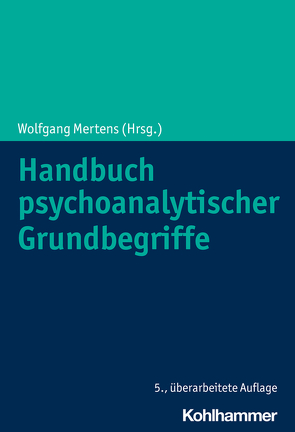
This handbook written by 140 scientists provides clear explanations, based on a standardized scheme, of the fundamental concepts of psychoanalysis. In addition to the definition of the terms, the classic understanding of them and their background in the history of ideas, and the further development of classical psychoanalysis into the individual schools are described in detail. At the same time, the handbook picks up from interdisciplinary debates by entering into a dialogue with neighbouring fields such as biology, psychology, sociology and cultural studies. Psychoanalysis, which many have repeatedly described as being obsolete and outdated, proves in this dictionary to be extremely creative and expansive. Those who are interested in the fundamental development of awareness, which is only conceivable through the inclusion of unconscious processes, will receive countless fresh ideas from this work. This fourth edition of the handbook has added the following concepts: general theory of seduction, desire, the occult, de-objectification, deciding, decision, implicit relationship knowledge, intersubjectivity, conversation, performance, psychodynamics, subject, separation anxiety & separation, unconscious & the Unconscious II, father metaphor, and transformational object.
Aktualisiert: 2023-05-02
Autor:
Thomas Auchter,
Werner Balzer,
Rosmarie Barwinski,
Markus Bassler,
Nikolaus Becker,
Karin Bell,
Wolfgang Berner,
Ulrich Berns,
Siegfried Bettighofer,
Manfred E. Beutel,
Werner Bohleber,
Lorenz Böllinger,
Brigitte Boothe,
Georg Bruns,
Michael B. Buchholz,
Dieter Bürgin,
Ralph J. Butzer,
Thomas Charlier,
Peter Conzen,
Gerhard Dammann,
Joachim Danckwardt,
Josef Dantlgraber,
Eckard Daser,
Heinrich Deserno,
Heinrich Dornes,
Birger Dulz,
Annegret Eckhardt-Henn,
Wolfram Ehlers,
Martin Ehlert Balzer,
Michael Ermann,
Gottfried Fischer,
Harald J Freyberger,
Willi Frings,
Oskar Frischenschlager,
Gudrun Fuchs,
Peter Geissler,
Hanna Gekle,
Alf Gerlach,
Patrizia Giampieri-Deutsch,
Ludger van Gisteren,
Günter Gödde,
Ralph Grabhorn,
Tilman Grande,
Jürgen Grieser,
Ludwig Haesler,
Andreas Hamburger,
Norbert Hartkamp,
Hans Peter Hartmann,
Stephan Hau,
Rolf Haubl,
Robert Heim,
Reinhard Hellmann,
Peter Henningsen,
Heinz Henseler,
Reinhard Herold,
Gereon Heuft,
Helmut Hinz,
Mathias Hirsch,
Albrecht Hirschmüller,
Udo Hock,
Rainer Holm-Hadulla,
Michael Hölzer,
Hans-Peter Kapfhammer,
Otto F. Kernberg,
Ingrid Kerz-Rühling,
Matthias Kettner,
Vera King,
Günther Klug,
Rolf Klüwer,
Thomas Köhler,
Hartmuth König,
Jürgen Körner,
Hartmut Kraft,
Rainer Krause,
Reinhard Kreische,
Martin Kurthen,
Ross Lazar,
Falk Leichsenring,
Günter Lempa,
Wolfgang Leuschner,
Marianne Leuzinger-Bohleber,
Elfriede Löchel,
Mathias Lohmer,
Christiane Ludwig-Körner,
Christian Maier,
Stavros Mentzos,
Wolfgang Mertens,
Wolfgang Milch,
Angela Moré,
Thomas Mueller,
Heinz Müller-Pozzi,
Waltraud Nagell,
Dietmut Niedecken,
Bernd Nitzschke,
Gerrd Overbeck,
Diana Pflichthofer,
Reinhard Plassmann,
Doris Pouget-Schors,
Hans Quint,
Hartmut Raguse,
Udo Rauchfleisch,
Günter Reich,
Stefan Reichard,
Reimut Reiche,
Christian Heinrich Röder,
Ulrich Rüger,
Sabine Anna Saalfeld,
Cordelia Schmidt-Hellerau,
Matthias Schmutz,
Karin Schneider-Henn,
Hellen Schoenhals Hart,
Lothar Schon,
Alfred Schöpf,
Ulrich Schultz-Venrath,
Gerhard Schüßler,
Günter H. Seidler,
Lucia Steinmetzer,
Achim Stephan,
Timo Storck,
Bernhard Strauß,
Ulrich Streeck,
Dieter Tenbrink,
Cornelia Thürheimer,
Winfrid Trimborn,
Rolf Vogt,
Heribert Wahl,
Ruth Waldeck,
Bruno Waldvogel,
Rolf-Peter Warsitz,
Peter Wegner,
Heinz Weiß,
Franz Wellendorf,
Corinna Wernz,
Jörg Wiesse,
Herbert Will,
Lutz Wittmann,
Michael Wolf,
Wolfgang Wöller,
Siegfried Zepf
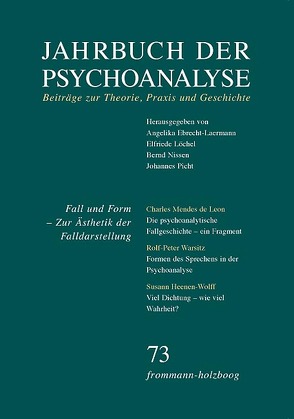
The ‹Jahrbuch der Psychoanalyse‹ (Yearbook of Psychoanalysis) was founded in 1960 as a scholarly medium for publication and discussion of the German Psychoanalytic Association. Its initial goal was to end the exile of psychoanalytic research and treatment, which had suffered heavy losses due to the rupture of civilization under National Socialism, as much as possible, to bring it back into use and to improve its potential for development. »Working in our own country while maintaining a constant exchange of ideas with the work of the psychoanalytic writers in the entire world»: This was the task which Anna Freud entrusted to the ‹Jahrbuch der Psychoanalyse‹ in 1960. It is still valid today as the basic principle of the dialogue in the diversity of psychoanalytic schools of thought.
Without any commitment to a specific school of thought, the ‹Jahrbuch‹ is based on the idea of the optionality of every interpretation which is protected from arbitrariness based on loyalty to a certain method. This idea applies to all the categories in the ‹Jahrbuch‹: clinical practice, clinical theory, metapyschology as well as applied psychoanalysis. In addition, it supports the long tradition of translations of the pre-released talks held at the international psychoanalytic conferences and the publication of the annual Karl Abrahan and the Wolfgang Loch lecture. The ‹Jahrbuch‹ focuses on the psychoanalytic-methodological essentials as prerequisites for the development of the wealth of experience and applications of psychoanalysis and tries to promote connections to the international discussion as well as the dialogue with neighboring disciplines from the fields of science, art and society.
Peer-reviewing, which was introduced in 2002, has helped with the selection and the improvement of the articles submitted. The regular publication of volumes on specific subjects has challenged the editorial staff and the publisher to provide a comprehensive introduction of a topic from various perspectives and ensure that this becomes a part of the scholarly discourse on this specific subject. The profile of the ‹Jahrbuch‹ is rounded out by the »supplements» in which pertinent monographs are published.
Aktualisiert: 2020-01-01
> findR *
Epistemological theories represent the foundation of clinical practice, enabling therapists to understand their own work better. At the same time, they are also fundamental to the self-image of a science or academic discipline in finding and keeping its place within the scientific and scholarly community. These points are particularly important for psychoanalysis, as the field has many collaborating partners, ranging from neurobiology to literary studies & and also because its scientific status is still disputed. This volume positions psychoanalysis epistemologically, but at the same time shows that it follows its own unmistakable epistemological pathway.
Aktualisiert: 2023-05-03
> findR *
Epistemological theories represent the foundation of clinical practice, enabling therapists to understand their own work better. At the same time, they are also fundamental to the self-image of a science or academic discipline in finding and keeping its place within the scientific and scholarly community. These points are particularly important for psychoanalysis, as the field has many collaborating partners, ranging from neurobiology to literary studies & and also because its scientific status is still disputed. This volume positions psychoanalysis epistemologically, but at the same time shows that it follows its own unmistakable epistemological pathway.
Aktualisiert: 2023-05-03
> findR *
Epistemological theories represent the foundation of clinical practice, enabling therapists to understand their own work better. At the same time, they are also fundamental to the self-image of a science or academic discipline in finding and keeping its place within the scientific and scholarly community. These points are particularly important for psychoanalysis, as the field has many collaborating partners, ranging from neurobiology to literary studies & and also because its scientific status is still disputed. This volume positions psychoanalysis epistemologically, but at the same time shows that it follows its own unmistakable epistemological pathway.
Aktualisiert: 2023-05-03
> findR *
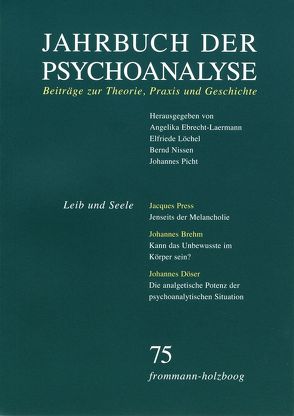
Rolf Kühn: Die Frage nach der therapeutischen Grunderfahrung. Ein lebensphänomenologischer Dialog mit Freud und Lacan
The Question of the Basic Experience of Psychotherapy – Phenomenology of Life in Dialogue with Freud and Lacan. The question of which phenomenology corresponds best to psychoanalysis and depth psychology has been discussed in France since Sartre. Here, it is examined with special reference to Lacan and Henry, two authors representing two radical positions: on one hand the chain of significants of alterity, leaving basically no room for subjectivity; on the other hand the notion of a purely phenomenological life in which subjectivity is founded originally in the living body. The examination draws on Freud who, by describing a distinct phenomenality of affect and instinct (Trieb) independent of phantasy, already knew an autonomous phenomenality of the body which he linked to the unconscious. With regard to therapeutic practice, a bridging is undertaken between these two approaches, and it is shown that the basic therapeutic experience implies a unity of desire and sense (Sinn) in which elements of existential analysis may be integrated in order to do justice to the overall requirement of patients in an increasingly heterogeneous social environment.
Udo Hock: Unbewusstes und Sein. Zum Verhältnis von Lebensphänomenologie und Psychoanalyse – Eine Antwort auf Rolf Kühn
Unconscious and Being: The Relationship between Phenomenology of Life and Psychoanalysis – A Reply to Rolf Kühn. In part one of this commentary Rolf Kühn‹s essay »Inquiring into the fundamentals of therapeutic experience« is placed in the wider context of philosophy and psychoanalysis. ›Daseinsanalyse‹ and ›Critical Theory‹ in Germany, the triad of structuralism, poststructuralism and deconstructivism in France are designated as the most important currents of human sciences which influenced and have been influenced by psychoanalysis. In the second part Kühn‹s »radicalised phenomenology of life« is analysed focusing on its main concepts (›corporeality‹, ›affectability‹, ›passibility‹). Their reference on Freud and Lacan is traced. In the last part some of Kühn‹s central positions are criticised and confronted with Lacan‹s and Laplanche‹s views on the unconscious.
Jacques Press: Jenseits der Melancholie: Von ›Trauer und Melancholie‹ zu ›Die Angst vor dem Zusammenbruch‹
Beyond Melancholia – From »Mourning and Melancholia« to »Fear of Breakdown«. The reflections given here derive from two sources: the author‹s clinical experience of oscillations between movements of melancholy and movements of breakdown; and his theoretical view on breakdown as a central psychosomatic crossing point. »Mourning and Melancholy« (Freud 1917e) and »Fear of Breakdown« (Winnicott 1991 [1974]) are submitted to comparative analysis, leading to the hypothesis that melancholy constitutes one of the most tenacious defences against an experience of breakdown. The clinical consequence the author sees from here is the task in each case to advance from the melancholy defense to the underlying breakdown.
Hanno Heymanns: Eine Winterreise: Zur psychoanalytischen Psychotherapie einer Hochbetagten zwischen Depression, physischer Gebrechlichkeit und beginnender Demenz
›Winterreise‹ – The Psychoanalytic Psychotherapy of an Aged Patient between Depression, Physical and Psychic Frailty, and Beginning Dementia. Using a case presentation, which centers on the theme of separation and on the process of transference/countertransference, the differential diagnosis of and psychodynamics between physical frailty, early dementia and depression are elaborated, and in this respect the interconnection of body and mind is discussed from a specific psychoanalytical perspective. The clinical material illustrates that the long prevailing deficit and defect model – especially of advanced age – currently has been replaced by a more dynamic point of view. It also proves Bion‹s statement regarding the onset of senility to which he attributes emotional turbulences as at adolescence. The concept of the contact-barrier, which was introduced by Freud and further elaborated by Bion, proves to be helpful to render the rearrangement of psychomental functioning in old age more comprehensible. In reverse perspective it is also reflected how the psychoanalyst‹s advanced age can impair and affect his/her mental functioning as an analyst.
Johannes Brehm: Kann das Unbewusste im Körper sein? Zum analytischen Umgang mit protomentalisierten Zuständen – eine Kasuistik
Can the Unconscious Be in the Body? The Psychoanalytic Handling of Protomentalized States – A Case Study. In primitive psychosomatic states emotional experiences are not as yet represented symbolically. Instead, they are experienced as states of excitement on a body-mind level, which can only be transformed within object relationships capable of resonance. This paper describes the first eighteen months of analytic treatment of a female patient with various psychosomatic symptoms in order to illustrate the processes of transformation of hitherto unrepresented states of psychosomatic excitement, which initially need to be enacted and realized within the transference. The analytic attitude required for this and the mental conceptualizations are pointed out in the presentation of the clinical material and in subsequent reflection. The paper concludes by elaborating some central aspects of our expanded knowledge of the significance of unrepresented states of excitement in the early processes of exchange between the infant and its primary objects – as they present themselves with regard to questions of technique in the treatment of our patients.
Johannes Döser: Die analgetische Potenz der psychoanalytischen Situation
The Analgesic Effect of the Psychoanalytical Situation. While the painfulness of the psychoanalytic process is frequently discussed, the analgesic effect of the psychoanalytic situation has so far received little attention. Based on metapsychology and the etiology of physical and mental pain, this paper examines the efforts of the traumatized subject to find regenerative pathways that allow linking up with pretraumatic integrity and help to cope with physical and narcissistic injury. Due to its stimulating effect on phantasy and dream activity, the analytic situation is associated with a significant psychoprosthetic function which limits destructive pain and counteracts the development of chronic pain. Findings from phantom pain- and placeboresearch can provide useful hints for psychoanalysts in the treatment of patients with persistent pain disorders.
Buchessay:
Uta Zeitzschel: Riccardo Lombardis ›Formless Infinity‹: Der Körper als Kompass
Riccardo Lombardis Formless Infinity – The Body as a Compass. Riccardo Lombardis book Formless Infinity (2016) is presented. Lombardi discusses the concepts of the unconscious, the role of the body in analysis, the reverie of the analyst, time, and death. He presents numerous clinical examples of working with psychotic patients and conceptualises his work based on theories of Bion and Matte-Blanco. Using a short case vignette, the author concludes with observations regarding the role of the body in analytic treatment.
Wolfgang-Loch-Vorlesung:
Joachim Küchenhoff / Rolf-Peter Warsitz: Von der Eigenständigkeit psychoanalytischer Erfahrung
On the Originality of Psychoanalytic Experience. Psychoanalysis has often been criticized to lack an epistemological basis. In this paper we answer this critique by outlining what we call a »dialectical epistemology of psychoanalysis«. In part 1, the impasses in the controversial discussions concerning the epistemological status of psychoanalysis up to now are highlighted. In part 2, we focus on the philosophical foundations of the dialectical concept we propose. We argue for an enlarged concept of language, its foundation in semiotics and its central role for psychoanalytic epistemology. We show that any anthropology or hermeneutics that might serve as a basis for psychoanalysis must consider and integrate negativity, due to the psychoanalytic notion of the unconscious implying different kinds of negative experience. Part 3 describes the dialectical model with respect to basic tools of psychoanalytic perception: The fundamental rules of psychoanalytic practice are extended by the notions of reverie and prosody, allowing integration into a psychoanalytic use of semiotic principles. Part 4 summarizes the central arguments.
Aktualisiert: 2020-01-01
Autor:
Hermann Beland,
Wolfgang Berner,
Johannes Brehm,
Johannes Döser,
Angelika Ebrecht-Laermann,
Friedrich-Wilhelm Eickhoff,
Terttu Eskelinen de Folch,
Claudia Frank,
Lilli Gast,
Ilse Grubrich-Simitis,
Ludger M. Hermanns,
Hanno Heymanns,
Helmut Hinz,
Udo Hock,
Albrecht Kuchenbuch,
Joachim Küchenhoff,
Rolf Kühn,
M. Egle Laufer,
Elfriede Löchel,
Bernd Nissen,
Johannes Picht,
Jaques Press,
Gerhard Schneider,
Rolf-Peter Warsitz,
Leon Wurmser,
Uta Zeitzschel
Spätestens seit der spektakulären Entscheidung der Bundesregierung unter Merkel vom 4. September 2015, die Grenzen für Tausende Flüchtlinge zu öffnen, steht Deutschland im Zeichen der Flüchtlingskrise. Die BeiträgerInnen dieses Sammelbandes nähern sich der Problematik zum einen hinsichtlich der praktischen Arbeit mit Geflüchteten, zum anderen hinsichtlich ihrer kulturellen, gesellschaftlichen und politischen Dimensionen.
Aktualisiert: 2023-03-30
Autor:
Heinz Bude,
Zeljko Cunovic,
Dorothee Dienstbühl,
Manfred Gerspach,
Marga Günther,
Rolf Haubl,
Hartmut Häußermann,
Anke Kerschgens,
Marian Kratz,
Joachim Küchenhoff,
Anna Leszczynska-Koenen,
Albert Scherr,
Rolf-Peter Warsitz,
Meike Weber,
Hans-Jürgen Wirth,
David Zimmermann
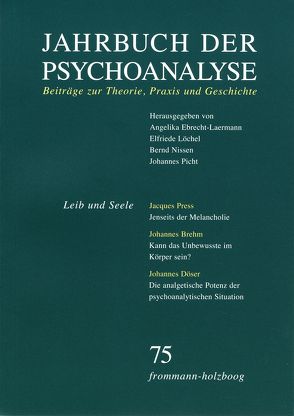
Rolf Kühn: Die Frage nach der therapeutischen Grunderfahrung. Ein lebensphänomenologischer Dialog mit Freud und Lacan
The Question of the Basic Experience of Psychotherapy – Phenomenology of Life in Dialogue with Freud and Lacan. The question of which phenomenology corresponds best to psychoanalysis and depth psychology has been discussed in France since Sartre. Here, it is examined with special reference to Lacan and Henry, two authors representing two radical positions: on one hand the chain of significants of alterity, leaving basically no room for subjectivity; on the other hand the notion of a purely phenomenological life in which subjectivity is founded originally in the living body. The examination draws on Freud who, by describing a distinct phenomenality of affect and instinct (Trieb) independent of phantasy, already knew an autonomous phenomenality of the body which he linked to the unconscious. With regard to therapeutic practice, a bridging is undertaken between these two approaches, and it is shown that the basic therapeutic experience implies a unity of desire and sense (Sinn) in which elements of existential analysis may be integrated in order to do justice to the overall requirement of patients in an increasingly heterogeneous social environment.
Udo Hock: Unbewusstes und Sein. Zum Verhältnis von Lebensphänomenologie und Psychoanalyse – Eine Antwort auf Rolf Kühn
Unconscious and Being: The Relationship between Phenomenology of Life and Psychoanalysis – A Reply to Rolf Kühn. In part one of this commentary Rolf Kühn‹s essay »Inquiring into the fundamentals of therapeutic experience« is placed in the wider context of philosophy and psychoanalysis. ›Daseinsanalyse‹ and ›Critical Theory‹ in Germany, the triad of structuralism, poststructuralism and deconstructivism in France are designated as the most important currents of human sciences which influenced and have been influenced by psychoanalysis. In the second part Kühn‹s »radicalised phenomenology of life« is analysed focusing on its main concepts (›corporeality‹, ›affectability‹, ›passibility‹). Their reference on Freud and Lacan is traced. In the last part some of Kühn‹s central positions are criticised and confronted with Lacan‹s and Laplanche‹s views on the unconscious.
Jacques Press: Jenseits der Melancholie: Von ›Trauer und Melancholie‹ zu ›Die Angst vor dem Zusammenbruch‹
Beyond Melancholia – From »Mourning and Melancholia« to »Fear of Breakdown«. The reflections given here derive from two sources: the author‹s clinical experience of oscillations between movements of melancholy and movements of breakdown; and his theoretical view on breakdown as a central psychosomatic crossing point. »Mourning and Melancholy« (Freud 1917e) and »Fear of Breakdown« (Winnicott 1991 [1974]) are submitted to comparative analysis, leading to the hypothesis that melancholy constitutes one of the most tenacious defences against an experience of breakdown. The clinical consequence the author sees from here is the task in each case to advance from the melancholy defense to the underlying breakdown.
Hanno Heymanns: Eine Winterreise: Zur psychoanalytischen Psychotherapie einer Hochbetagten zwischen Depression, physischer Gebrechlichkeit und beginnender Demenz
›Winterreise‹ – The Psychoanalytic Psychotherapy of an Aged Patient between Depression, Physical and Psychic Frailty, and Beginning Dementia. Using a case presentation, which centers on the theme of separation and on the process of transference/countertransference, the differential diagnosis of and psychodynamics between physical frailty, early dementia and depression are elaborated, and in this respect the interconnection of body and mind is discussed from a specific psychoanalytical perspective. The clinical material illustrates that the long prevailing deficit and defect model – especially of advanced age – currently has been replaced by a more dynamic point of view. It also proves Bion‹s statement regarding the onset of senility to which he attributes emotional turbulences as at adolescence. The concept of the contact-barrier, which was introduced by Freud and further elaborated by Bion, proves to be helpful to render the rearrangement of psychomental functioning in old age more comprehensible. In reverse perspective it is also reflected how the psychoanalyst‹s advanced age can impair and affect his/her mental functioning as an analyst.
Johannes Brehm: Kann das Unbewusste im Körper sein? Zum analytischen Umgang mit protomentalisierten Zuständen – eine Kasuistik
Can the Unconscious Be in the Body? The Psychoanalytic Handling of Protomentalized States – A Case Study. In primitive psychosomatic states emotional experiences are not as yet represented symbolically. Instead, they are experienced as states of excitement on a body-mind level, which can only be transformed within object relationships capable of resonance. This paper describes the first eighteen months of analytic treatment of a female patient with various psychosomatic symptoms in order to illustrate the processes of transformation of hitherto unrepresented states of psychosomatic excitement, which initially need to be enacted and realized within the transference. The analytic attitude required for this and the mental conceptualizations are pointed out in the presentation of the clinical material and in subsequent reflection. The paper concludes by elaborating some central aspects of our expanded knowledge of the significance of unrepresented states of excitement in the early processes of exchange between the infant and its primary objects – as they present themselves with regard to questions of technique in the treatment of our patients.
Johannes Döser: Die analgetische Potenz der psychoanalytischen Situation
The Analgesic Effect of the Psychoanalytical Situation. While the painfulness of the psychoanalytic process is frequently discussed, the analgesic effect of the psychoanalytic situation has so far received little attention. Based on metapsychology and the etiology of physical and mental pain, this paper examines the efforts of the traumatized subject to find regenerative pathways that allow linking up with pretraumatic integrity and help to cope with physical and narcissistic injury. Due to its stimulating effect on phantasy and dream activity, the analytic situation is associated with a significant psychoprosthetic function which limits destructive pain and counteracts the development of chronic pain. Findings from phantom pain- and placeboresearch can provide useful hints for psychoanalysts in the treatment of patients with persistent pain disorders.
Buchessay:
Uta Zeitzschel: Riccardo Lombardis ›Formless Infinity‹: Der Körper als Kompass
Riccardo Lombardis Formless Infinity – The Body as a Compass. Riccardo Lombardis book Formless Infinity (2016) is presented. Lombardi discusses the concepts of the unconscious, the role of the body in analysis, the reverie of the analyst, time, and death. He presents numerous clinical examples of working with psychotic patients and conceptualises his work based on theories of Bion and Matte-Blanco. Using a short case vignette, the author concludes with observations regarding the role of the body in analytic treatment.
Wolfgang-Loch-Vorlesung:
Joachim Küchenhoff / Rolf-Peter Warsitz: Von der Eigenständigkeit psychoanalytischer Erfahrung
On the Originality of Psychoanalytic Experience. Psychoanalysis has often been criticized to lack an epistemological basis. In this paper we answer this critique by outlining what we call a »dialectical epistemology of psychoanalysis«. In part 1, the impasses in the controversial discussions concerning the epistemological status of psychoanalysis up to now are highlighted. In part 2, we focus on the philosophical foundations of the dialectical concept we propose. We argue for an enlarged concept of language, its foundation in semiotics and its central role for psychoanalytic epistemology. We show that any anthropology or hermeneutics that might serve as a basis for psychoanalysis must consider and integrate negativity, due to the psychoanalytic notion of the unconscious implying different kinds of negative experience. Part 3 describes the dialectical model with respect to basic tools of psychoanalytic perception: The fundamental rules of psychoanalytic practice are extended by the notions of reverie and prosody, allowing integration into a psychoanalytic use of semiotic principles. Part 4 summarizes the central arguments.
Aktualisiert: 2019-10-08
Autor:
Hermann Beland,
Wolfgang Berner,
Johannes Brehm,
Johannes Döser,
Angelika Ebrecht-Laermann,
Friedrich-Wilhelm Eickhoff,
Terttu Eskelinen de Folch,
Claudia Frank,
Lilli Gast,
Ilse Grubrich-Simitis,
Ludger M. Hermanns,
Hanno Heymanns,
Helmut Hinz,
Udo Hock,
Albrecht Kuchenbuch,
Joachim Küchenhoff,
Rolf Kühn,
M. Egle Laufer,
Elfriede Löchel,
Bernd Nissen,
Johannes Picht,
Jaques Press,
Gerhard Schneider,
Rolf-Peter Warsitz,
Leon Wurmser,
Uta Zeitzschel
MEHR ANZEIGEN
Bücher von Warsitz, Rolf-Peter
Sie suchen ein Buch oder Publikation vonWarsitz, Rolf-Peter ? Bei Buch findr finden Sie alle Bücher Warsitz, Rolf-Peter.
Entdecken Sie neue Bücher oder Klassiker für Sie selbst oder zum Verschenken. Buch findr hat zahlreiche Bücher
von Warsitz, Rolf-Peter im Sortiment. Nehmen Sie sich Zeit zum Stöbern und finden Sie das passende Buch oder die
Publiketion für Ihr Lesevergnügen oder Ihr Interessensgebiet. Stöbern Sie durch unser Angebot und finden Sie aus
unserer großen Auswahl das Buch, das Ihnen zusagt. Bei Buch findr finden Sie Romane, Ratgeber, wissenschaftliche und
populärwissenschaftliche Bücher uvm. Bestellen Sie Ihr Buch zu Ihrem Thema einfach online und lassen Sie es sich
bequem nach Hause schicken. Wir wünschen Ihnen schöne und entspannte Lesemomente mit Ihrem Buch
von Warsitz, Rolf-Peter .
Warsitz, Rolf-Peter - Große Auswahl an Publikationen bei Buch findr
Bei uns finden Sie Bücher aller beliebter Autoren, Neuerscheinungen, Bestseller genauso wie alte Schätze. Bücher
von Warsitz, Rolf-Peter die Ihre Fantasie anregen und Bücher, die Sie weiterbilden und Ihnen wissenschaftliche Fakten
vermitteln. Ganz nach Ihrem Geschmack ist das passende Buch für Sie dabei. Finden Sie eine große Auswahl Bücher
verschiedenster Genres, Verlage, Schlagworte Genre bei Buchfindr:
Unser Repertoire umfasst Bücher von
- Warsitzka, Wilfried
- Warsönke, Anette
- Warsönke, Annette
- Warsönke, Annette
- Warstat, Ellen
- Warstat, Katja
- Warstat, Kessy
- Warstat, Malthe
- Warstat, Matthias
- Warstone, Robert
Sie haben viele Möglichkeiten bei Buch findr die passenden Bücher für Ihr Lesevergnügen zu entdecken. Nutzen Sie
unsere Suchfunktionen, um zu stöbern und für Sie interessante Bücher in den unterschiedlichen Genres und Kategorien
zu finden. Neben Büchern von Warsitz, Rolf-Peter und Büchern aus verschiedenen Kategorien finden Sie schnell und
einfach auch eine Auflistung thematisch passender Publikationen. Probieren Sie es aus, legen Sie jetzt los! Ihrem
Lesevergnügen steht nichts im Wege. Nutzen Sie die Vorteile Ihre Bücher online zu kaufen und bekommen Sie die
bestellten Bücher schnell und bequem zugestellt. Nehmen Sie sich die Zeit, online die Bücher Ihrer Wahl anzulesen,
Buchempfehlungen und Rezensionen zu studieren, Informationen zu Autoren zu lesen. Viel Spaß beim Lesen wünscht Ihnen
das Team von Buchfindr.
